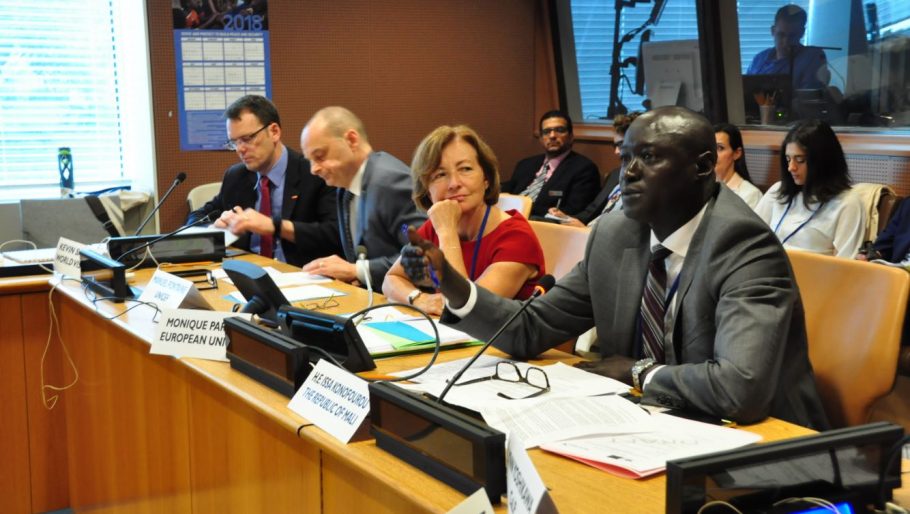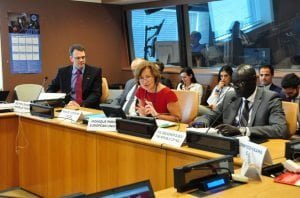Three Takeaways from the ECOSOC-HAS Discussion on Linking Cash Transfers with Social Protection Systems


Social protection has been the latest buzzword in the aid world – with good reason. In the State of the World’s Cash report, linking humanitarian cash transfers and social protection systems was identified as a critical debate. Currently, the majority of humanitarian action takes place in protracted crises, many of which experience recurrent and increasingly severe shocks, as a result of both conflict and natural disasters. However, humanitarian financing mechanisms are short-term and unpredictable, leading to inefficiencies in the response and limited opportunities to address the root causes driving humanitarian needs. As a result, there is rapidly increasing interest by governments and donors alike in building or strengthening social protection systems to protect the poorest and most vulnerable people.
Against this backdrop, and with Grand Bargain signatories agreeing that links with social protection should be one of the priorities in the cash workstream going forward, the CALP Network moderated a panel discussion at the United Nations Economic and Social Council Humanitarian Affairs Segment (ECOSOC HAS) to discuss opportunities, challenges and lessons learned on linking cash transfers in emergencies to social protection systems on 21 June.
This side-event brought together governments, UN agencies, NGOs and donors, and the panel included:
- Monique Pariat, Director General, European Humanitarian Aid and Civil Protection Office
- Ambassador Issa Konfourou, Permanent Representative to the UN, The Republic of Mali
- Kevin Savage, Humanitarian Research Director, World Vision International
- Manuel Fontaine, Director, Office of Emergency Programs, UNICEF
- Seb Fouquet, Senior Humanitarian Adviser, Department for International Development
- Lynn Yoshikawa, Regional Representative, the Cash Learning Partnership
The panel encompassed a range of perspectives, but three overarching themes emerged from the panellists’ reflections.
1) Preparedness is essential
It takes time to build relationships, policies, and systems that lay the groundwork for social protection systems to be shock-responsive.
Monique Pariat urged humanitarians to have a longer-term vision to put the humanitarian-development nexus into practice. “With 80% of humanitarian assistance used in protracted crises, there is no choice but to think big,” she stated in keynote remarks. She argued that cash transfers will be instrumental in this challenge as they provide the opportunity to address more needs, more efficiently and more effectively.
Based on its extensive experience with cash transfers in countries as diverse as Somalia, Turkey, Malawi, Ethiopia, the EU learned that it is essential that humanitarian actors look at national social protection systems before setting up the cash transfer programming, as well as supporting the preparedness of national social protection systems to be shock-responsive.
2) Coordination should be built on early and effective dialogue, between humanitarian actors, governments, and finance institutions – and put affected people at the center.
This is easier said than done, based on the cash community’s ongoing challenge in ensuring effective coordination, but Ambassador Issa Konfourou of The Republic of Mali put it best: “Focus on the objective – helping people in need – and take the politics out.” The actors involved in social protection are much more diverse than in humanitarian response alone, and dialogue is essential to develop trust and coordinate between siloed humanitarian and development mechanisms and funding streams.
Kevin Savage, drawing on research undertaken by World Vision on the impact of unrestricted cash and vouchers on nutrition in Somalia, described a range of opportunities for cash transfer programs to be better aligned with national social protection systems in that context. Specifically, he suggested addressing inter-operability between government and humanitarian data systems, developing common targeting and cash transfer amounts among donors and implementing organizations, ensuring funding predictability through multi-year funding, and ensuring humanitarian programming is aligned with Somalia’s national development plan for social protection.
Meanwhile, Ambassador Issa Konfourou described Mali’s approach to addressing its crisis. The key he claimed is to strengthen the resilience of Mali’s population through social cohesion and for the state to contribute through social protection programs. The Jigisemejiri (‘Tree of Hope’) social protection program targets 60,000 people with unrestricted cash transfers to address basic needs, with support from the World Bank.
However, challenges need to be addressed for its success, such as addressing aid (including social protection) dependency in the long term, addressing long-term financing of Jigisemejiri and other social protection programs, and coordinating among diverse actors, including the World Bank and humanitarian agencies, to work together; for example on common needs assessments. Trust among all actors is essential and can be built by developing a common vision of how to address the needs of affected populations.
3) There is no ‘one size fits all’ solution to linking humanitarian response to national social protection systems.
Collaboration will vary and will be dependent on local and national capacities to establish, expand, and coordinate social protection programs.
Manuel Fontaine shared several examples of how UNICEF built on existing social protection systems and how they established a system in contexts where they don’t already exist. In Yemen for example, UNICEF used the same national social protection system’s design, beneficiary list, and cash transfer frequency, but adapted it to the emergency context. Meanwhile in Turkey, UNICEF mirrored a program by the government to target Syrian children attending school and used the same transfer amounts, although it used a separate registration, monitoring and delivery mechanism.
Adding to the coordination chorus, he emphasised the importance of having effective strategic and technical coordination. “We cannot afford to be uncoordinated… It is challenging but it should be a priority,” he stated. The process for identifying the best approach to building or strengthening social protection systems must be based on in-depth country level analysis. The process takes time, therefore the emphasis should be placed on preparedness. He summarised the priorities as follows: assess the social protection systems that exist for their capacity to be more shock-responsive; assess the risks of corruption; and go from asking ourselves ‘why not cash?’ to ‘why not social protection?’
In closing, Seb Fouquet reflected on how cash has made this conversation possible, by requiring all actors to work more collaboratively, and energized the decades-long conversation between humanitarian and development actors. He identified common themes, such as the need to put people first and build trust among actors, consideration of the fact that humanitarian and development actors understand and address vulnerability in different ways, and the need for humanitarians to reflect on how cash transfer programs are designed and the long-term fiscal implications for governments.
From the CALP Network’s perspective, the discussion further underlined the urgency to strengthen cash coordination – as emphasized in the CALP Network’s Global Framework for Action – not just to make the best strategic use of cash transfers in emergencies and early recovery, but to ensure we are laying the foundations for more sustainable systems whenever possible. A number of CALP’s members are taking a lead role in moving this thinking forward, including through the cash workstream of the Grand Bargain. We will work with our members and other stakeholders to build the evidence base for shock-responsive social protection systems and, as the practice continues to rapidly evolve, facilitate learning among stakeholders and across contexts.
Lynn Yoshikawa, the CALP Network’s North America regional representative


